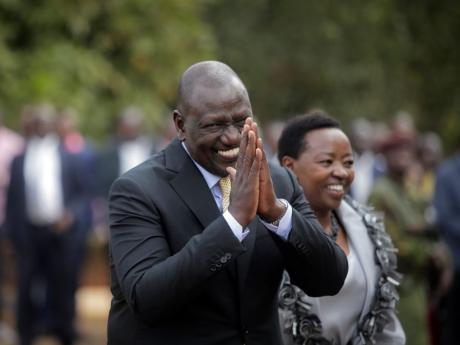Kenya’s president warns of huge consequences after his effort to address an $80 billion debt fails
NAIROBI, Kenya (AP) — The ballooning debt in East Africa's economic hub of Kenya is expected to grow even more after deadly protests forced the rejection of a finance bill that President William Ruto said was needed to raise revenue. He now warns “it will have huge consequences.”
Facing public calls to resign, Ruto has said the government will turn to slashing a $2.7 billion budget deficit by half and borrowing the rest, without saying from where.
After anger over bloated bureaucracy and luxurious lives of senior officials helped to fuel the protests, Ruto also has promised funding cuts in his own office and said funding would stop for the offices of the first lady, the “second lady” — the wife of the vice president — and the wife of the prime Cabinet secretary. Almost four dozen state enterprises with overlapping roles will be closed.
Ruto has become deeply unpopular in his two years in office over his quest to introduce taxes meant to enable Kenya to repay its $80 billion public debt to lenders including the World Bank, the International Monetary Fund and China.
The public debt makes up about 70% of Kenya's gross domestic product, the highest in 20 years.
How Ruto's administration will find the money to pay off debt without further angering millions of Kenyans barely getting by, and without slowing down the economy, is the key question. The economy grew 5.6% in 2023.
Economist Mbui Wagacha, a former adviser to previous President Uhuru Kenyatta, said Kenya needs a professional budget and management body like the Office of Management and Budget in the US. Currently, Kenya's treasury makes budget estimates and forwards them to the parliamentary finance committee, which creates the finance bills.
“Parliament has abdicated its mandate on the public finances in the Constitution and it's looking after its own interests,” Wagacha said in an interview.
He said further borrowing by Kenya could be “disastrous” and proposed a strategy of using diplomacy to attract investment and restructuring the debt in an attempt to get creditors to write off some of it.
Another economist, Ken Gichinga, agreed that government borrowing will slow down Kenya's economy. Businesses still haven't recovered from the effects of the COVID pandemic and the war in Ukraine, he said.
“When the government borrows more, interest rates go up. And when interest rates go up, businesses slow down, the economy slows down, due to the high cost of repayment,” Gichinga said.
Kenya's president has advocated self-sustainability, saying the country should raise more revenue instead borrowing. “If we are a serious state, we must be able to enhance our taxes,” he said in May.
But Kenyans have rejected attempts to raise taxes as they struggle with rising prices on basic goods, even storming parliament during the recent protests.
Follow The Gleaner on X, formerly Twitter, and Instagram @JamaicaGleaner and on Facebook @GleanerJamaica. Send us a message on WhatsApp at 1-876-499-0169 or email us at onlinefeedback@gleanerjm.com or editors@gleanerjm.com.

